- Home
- Jack Kerouac
The Sea Is My Brother: The Lost Novel Page 7
The Sea Is My Brother: The Lost Novel Read online
Page 7
Wesley picked up Bill’s suitcase. “Let’s have a few cold beers,” he proposed.
“Righto!”
“There’s a place,” noted Wesley, gesturing toward the other side of the street. “Let’s mosey over.”
While they crossed, Bill talked on: “I think I realize now why the pioneer spirit always guided me in my thinking—it’s because he’s free, Wes, free! He is like the skylark when contrasted to the settler, the man who plants his roots and leans back. The pioneer is free because he moves on and forgets to leave a trace. God!”
They entered a rowdy-looking barroom and occupied a booth with a sticky tabletop. Drinkers of all types sat ranged at the bar, old barflies, soldiers, broken-down hags, loud young men who gestured constantly at one another, and an occasional workingman still clad in his soiled workclothes.
A waitress brought them two large beers; and, leaning an indifferent hand on the back of the booth, she said: “Twenty dollars, darlings.”
Wesley winked at her briefly while Bill threw two dimes on the table. She gave Wesley a hard, challenging look as she scooped up the coins: “honey,” she told him huskily, “take care of them eyes.”
“What’s wrong with them?” demanded Wesley.
“They’ll get you into trouble,” she replied still watching him with heavy, malign ravishment. She backed away with a serious, brooding countenance, her eyes locked on Wesley’s. He answered her eyes with the same challenging impudence, the same slow, sensual defiance, the bid of brute to brute.
“My God!” snickered Bill when she had left. “So this is Hartford! The rape of Wesley Martin!”
Wesley rubbed the side of his nose.
“Brother,” he said quietly, “that’s something that can kill a whole ship’s crew in two weeks.”
Everhart roared with laughter while Wesley drank his beer with a crafty smile.
Later, after a few beers, they ate pork chops in a lunchcart on Main Street where Wesley bought two packages of Luckies and gave one of them to a vag who had begged for a cigarette.
“Where are we going to sleep?” Bill asked when they were back in the street. Wesley was picking his teeth with a toothpick.
“If this was New York,” he said, “we could sleep in an all-night show or a subway. Hell, I dunno.”
They roamed up and down Main Street, peering into bars and smoking. Finally, they grew restless; Wesley suggested they take in a late movie, but Everhart was dubious: “What are we going to eat with tomorrow?” he told Wesley.
“Who gives a shuck-all about tomorrow!” Wesley muttered scornfully. “Let’s see a movie.”
They went in. At midnight, they were back in the street; it was almost deserted. A few aircraft workers were returning from work in groups, talking in low, tired tones. A policeman teetered on his heels beside a cigar store.
“We’d better duck before we’re pulled in,” suggested Wesley. “Let’s go see if we can find a place to sleep a few hours, before sunup.”
“It’s warm enough to sleep out,” added Bill.
They walked East across the bridge and over to East Hartford. A dark, vacant lot offered plenty of thick matty grass, so they slumped down behind a clump of shrubs. Wesley was asleep in five minutes.
Everhart couldn’t sleep for an hour. He lay on his back and watched the richly clustered stars high above; a cricket chirped not three feet away. The grass was damp, though he could feel its substratum of sunfed warmth. A coolness had crept into the night air; Bill pulled his collar up. He heard steps sounding down a nearby gravel path . . . a cop? Bill glanced over; he saw nothing in the darkness. A door opened, closed.
Well! Here he was sleeping in a backlot, a man with a post in a University, like so many other tramps. Wesley, there, sleeping as though nothing in the world mattered to him; one couldn’t call him a tramp, could one? Who was this strange young man, very much a boy and yet very much a man? A seaman . . . yes, Everhart too would be a seaman.
Why?
Why had he done this? If his life in New York had seemed purposeless and foolish, then what could one call this life, this aimless wandering? If war had called Ulysses away from Syracuse, what had called Everhart away from New York?
Often he had told his classes about Fate, quoting devotedly from Emerson, from Shakespeare; he had spoken of Fate with the cheerful certainty that only a pedagogue could attain. That was his trouble, he had been a fearless pedagogue. And now? Certainly not a fearless man; he was full of fear, and why not? . . . he knew not what was coming. Would fear, the knowledge and the wisdom of fear, drive the pedantry from his foolish being?
What of Fate? Ah, she was a charming lady, Fate, see how she had woven her skin from New York to Hartford in a few brief hours, changed a man from a pedagogue to a trembling scholar, had made her day sunny and her night warm with the thrill and potency of mystery, had stolen to his side and for a moment of terrible glory, in the night, revealed to him her design of designs—that no man may know, but each may wait, wonder, and, according to the powers of his spirit, resist!
Everhart raised himself on his elbows . . . . the cricket stopped its song, fearful . . . . all the world slumbered in a massive hush. He could hear Wesley’s slow breathing; above the stars nodded silently, nameless and far. “Me?” cried Wesley.
Everhart jumped nervously, his heart suddenly . . . pounding with fear. But Wesley was asleep—he had cried out in a dream.
Wesley was shaking his arm.
“Wake up, Bill, we’re rollin’,” he was saying in a husky morning voice.
It was still dark, but a few birds had begun to twitter a tiny alarum from the mist. Everhart rolled over and groaned: “What?”
“Wake up man, you ain’t home?”
Everhart sat up rigidly, stupefied.
“By George,” he growled, “you’re right!”
Wesley was sitting on the grass, yawning and stretching his arms. The morning mist seeped into them with a raw, chill silence. “Let’s move,” repeated Wesley, “before we freeze to death.”
They rose and walked off toward the street, not particularly inclined to talk to one another; an auto went by, leaving its rush of dust and gasoline fumes, growling off up the misty street like an ill-tempered old dog. Over the rooftops, a gray light was manifesting itself. It was a gloomy, unpleasant morning.
The two travelers had coffee in a lunch cart near the railroad tracks and scowled in unison when the counterman told them they looked as though they’d spend the night in a barn.
Once again in the street, the gray light had spread wide across the sky; they saw heavy clouds rushing in to darken the morning.
“Might rain,” grunted Everhart.
They walked down the road and turned slowly as a car approached. It passed them swiftly, giving both a glimpse of a sleepy, surly face at the wheel. The road looked clean and ready for a new day in the dim morning light; it stretched up a hill and around a curve, beyond which they could make out a horizon of telephone poles, farms (winking small breakfast lights), and further beyond, rangy gray hills almost undiscernible in the mist. It smelled rain.
“Oh Christ!” yawned Wesley loudly. “I’ll be glad when I can crawl into my berth!”
“Are you sure about that ship in Boston?”
“Yeah . . . The Westminster, transport-cargo, bound for Greenland; did you bring your birth certificate, man?”
Everhart slapped his wallet: “Right with me.”
Wesley yawned again, pounding his breast as if to put a stop to his sleepiness. Everhart found himself wishing he were back home in his soft bed, with four hours yet to sleep before Sis’s breakfast, while the milkman went by down on Claremont Avenue and a trolley roared past on sleepy Broadway.
A drop of rain shattered on his brow.
“We’d best get a ride right soon!” muttered Wesley turning to gaze down the deserted road.
They took shelter beneath a tree while the rain began to patter softly on the overhead leaves; a wet, steamy ar
oma rose in a humid wave.
“Rain, rain go away,” Wesley sang softly, “come again another day . . .”
Ten minutes later, a big red truck picked them up. They smiled enthusiastically at the driver.
“How far you goin’, pal?” asked Wesley.
“Boston!” roared the driver, and for the next hundred and twenty miles, while they traveled through wet fields along glistening roads, past steaming pastures and small towns, through a funeral [in] Worcester, down a splashing macadam highway leading directly toward Boston under lowering skies, the truckman said nothing further.
Everhart was startled from a nervous sleep when he heard Wesley’s voice . . . . hours had passed swiftly.
“Boston, man!”
He opened his eyes; they were rolling along a narrow, cobblestoned street, flanked on each side with grim warehouses. It had stopped raining.
“How long have I been sleeping?” grinned Bill, rubbing his eyes while he held the spectacles on his lap.
“Dunno,” answered Wesley, drawing from his perennial cigarette. The truck driver pulled to a lurching halt.
“Okay?” he shouted harshly.
Wesley nodded: “thanks a million, buddy. We’ll be seeing you.”
“So long, boys,” he called. “See you again!”
Everhart jumped down from the high cab and stretched his legs luxuriously, waving his hand at the truck driver. Wesley stretched his arms slowly: “Eeyah! That was a long ride; I slept a bit myself.”
They stood on a narrow sidewalk, which had already begun to dry after the brief morning rain. Heavy trucks piled past in the street, rumbling on the ancestral cobbles, and it wasn’t until a group of them had gone, leaving the street momentarily deserted and clear of exhaust fumes, that Bill detected a clean sea smell in the air. Above, broken clouds scuttled across the luminous silver skies; a ray of warmth had begun to drop from the part of the sky where a vague dazzle hinted the position of the sun.
“I’ve been to Boston before,” chatted Bill, “but never like this . . . this is the real Boston.”
Wesley’s face lit in a silent laugh: “I think you’re talkin’ through your hat again man! Let’s start the day off with a beer on Scollay Square.”
They walked on in high spirits.
Scollay Square was a short five minutes away. Its subway entrances, movie marquees, cut-rate stores, passport photo studios, lunchrooms, cheap jewelry stores and bars faced the busy traffic of the street with a vapid morning sullenness. Scores of sailors in Navy whites sauntered along the cluttered pavements, stopping to gaze at cheap store fronts and theater signs.
Wesley lead Bill to a passport photo studio where an old man charged them a dollar for two small photos.
“They’re for your seaman’s papers,” explained Wesley. “How much money does that leave you?”
“A quarter,” Everhart grinned sheepishly.
“Two beers and a cigar; let’s go,” Wesley said, rubbing his hands. “I’ll borrow a fin from a seaman.”
Everhart looked at his pictures: “Don’t you think I look like a tough seadog here?”
“Hell man, yes!” cried Wesley.
In the bar they drank a bracing glass of cold beer and talked about Polly, Day, Ginger and Eve.
“Nice bunch of kids,” said Wesley slowly.
Everhart gazed thoughtfully at the bartap: “I’m wondering how long Polly waited for us last night. I’ll bet this is the first time Madame Butterfly was ever stood up!” he added with a grin. “Polly’s quite the belle around Columbia, you know.” It sounded strange to say “Columbia” . . . how far away was it now?
“I didn’t mean to play a wood on her,” said Wesley at length. “But hell, when you’re on the move, you’re on the move! I’ll see her some other time.”
“Won’t George Day be surprised when he learns I’ve gone and wasn’t fooling about joining the Merchant Marine!” laughed Bill. “I left on the spur of the moment. It’ll be the talk of the place.”
“What’s Eve gonna say?” asked Wesley.
“Oh I don’t know; I never was very serious with Eve, anyway. We’ve had a lot of great times together, parties and all that, but we were just good friends. I haven’t been serious over a girl since I was in my teens.”
A sailor behind them slid a nickel into the big music box and danced slowly across the floor as Bing Crosby sang “Please Don’t Take My Sunshine Away.”
“Pop!” shouted the young sailor, addressing the bartender, “It’s a great man’s Navy!”
“Keep it that way,” answered the older man. “It was in my day. Come on over here till I set you up a drink—what’ll you have? Take your choice!”
“Pop!” bellowed the sailor flopping on a stool, “I’m gonna set up you to a drink, you bein’ an old Navy man yerself.” He produced a dark brown bottle from his hip pocket. “Jamaica Rum!” he announced proudly.
“All right,” said the bartender, “you give me a swallow o’ that Rum and I’ll set you up a drink that’ll make your eyes pop.”
“Impossible,” muttered the sailor, turning to Wesley. “Am I right?”
“Right!” said Wesley.
The sailor handed his bottle over to Wesley: “Try some o’ that Jamaica Rum, buddy; try it.”
Wesley nodded and proceeded to wash down a long draught; recapping the bottle he handed it back without comment.
“Well?” asked the sailor.
“Right!” snapped Wesley.
The sailor turned, brandishing the bottle: “Right, he says . . . damn right it’s right. This is Jamaica Rum, imported . . . Johnny’s own whoopee water!”
When Bill and Wesley finished their beers, they walked out in silence; at the door Wesley turned as the sailor called him: “Right, feller?”
Wesley pointed his forefinger toward the sailor.
“Right!” he shouted, winking an eye.
“Right, he says!” sang the sailor once more flourishing his bottle.
“Well! We’re in Boston,” beamed Bill when they were back on the street. “What’s on the docket?”
“First thing to do,” said Wesley, leading his companion across the street, “is to mosey over to the Union Hall and check up on the Westminster . . . we might get a berth right off.”
They walked down Hanover Street, with its cheap shoe stores and bauble shops, and turned left at Portland Street, a battered door, bearing the inscription “National Maritime Union,” lead up a flight of creaking steps into a wide, rambling hall. Grimy windows at each end served to allow a gray light from outside to creep inward a gloomy, half-hearted illumination which outlined the bare, unfurnished immensity of the room. Only a few benches and folding chairs had been pushed against the walls, and these were now occupied by seamen who sat talking in low tones: they were dressed in various civilian clothing, but Everhart instantly recognized them as seamen . . . there, in the dismal gloom of their musty-smelling shipping headquarters, these men sat, each with the patience and passive quiet of men who know they are going back to sea, some smoking pipes, others calmly perusing the “Pilot,” official N.M.U publication, others dozing on the benches, and all possessed of the serene waiting wisdom of a Wesley Martin.
“Wait here,” said Wesley, shuffling off toward the partitioned office across the broad plank floor. “I’ll be right back.” Everhart sat on the suitcase, peering.
“Hey Martin!” howled a greeting voice from the folding chairs. “Martin you old crum!” A seaman was running across the hall toward Wesley, whooping with delight in his discovery. The echoing cries failed to disturb the peace of the other seamen, though, indeed; they glanced briefly and curiously toward the noisy reunion.
Wesley was astounded.
“Jesus!” he cried. “Nick Meade!”
Meade fairly collapsed into Wesley, almost knocking him over in his zeal to come to grips in a playful, bearish embrace; they pounded each other enthusiastically, and at one point Meade went so far as to push Wesley’s chin gently with
his fist, calling him as he did so every conceivable name he could think of; Wesley, for his part, manifested his delight by punching his comrade squarely in the stomach and howling a vile epithet as he did so. They whooped it up raucously for at least a half a minute while Everhart grinned appreciatively from his suitcase.
Then Meade asked a question in a low tone, hand on Wesley’s shoulder; the latter answered confidentially, to which Meade roared once more and began anew to pummel Wesley, who turned away, his thin frame shaking with soundless laughter. Presently, they made their way toward the office, exchanging news with the breathless rapidity of good friends who meet after a separation of years.
“Shipping out?” raced Meade.
“Yeah.”
“Let’s see Harry about a double berth.”
“Make it three, I’ve got a mate with me.”
“Come on! The Westminster’s in port; she’s taking on’most a full crew.”
“I know.”
“You old son of a bitch!” cried Meade, unable to control his joy at the chance meeting. “I haven’t seen you since forty,” kicking Wesley in the pants, “when we got canned in Trinidad!”
“For startin’ that riot!” remembered Wesley, kicking back playfully while Meade dodged aside. “You friggin’ communist, don’t start. Kickin’ me again . . . I remember the time you got drunk aboard ship and went around kickin’ everybody till that big Bosun1 pinned your ears back!”
They howled their way into the inner office where a sour faced Union man looked up blandly from his papers.
“Act like seamen, will you?” he growled.
“Hangover Harry,” informed Meade. “He uses up all the dues money to get drunk. Look at that face will you?”
“All right Meade,” admonished Harry. “What are you looking for, I’m busy . . .”
They made arrangements to be on hand and near the office door that afternoon when the official ship calls from the S.S. Westminster would be posted, although Harry warned them those first come would be first served. “Two-thirty sharp,” he grunted. “If you’re not here, you don’t get the jobs.”
Wesley introduced Meade to Everhart and they all went around the corner for a quick beer. Meade was a talkative, intelligent young man in his late twenties who stroked an exquisite brown moustache with voluptuous afterthought as he rambled on, a faint twinkle in the bland blue eyes, walking in a quickstepping glide that wove between pedestrians as though they were not there. On the way to the bar on Hanover Street, he shouted at least three insults to various passersby who amused his carefree fancy.

 Tristessa
Tristessa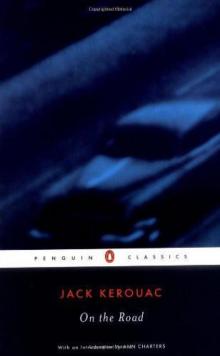 On the Road
On the Road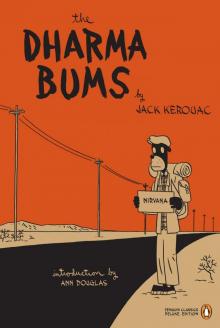 The Dharma Bums
The Dharma Bums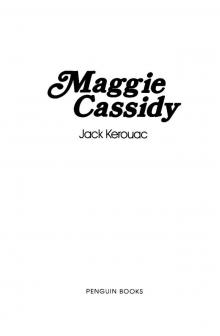 Maggie Cassidy
Maggie Cassidy Big Sur
Big Sur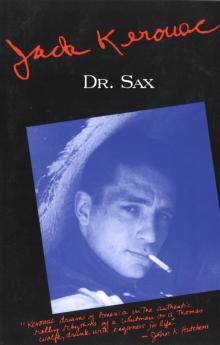 Dr. Sax
Dr. Sax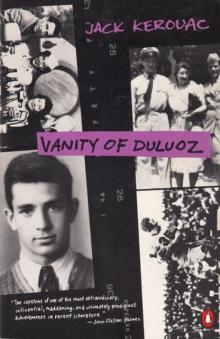 Vanity of Duluoz: An Adventurous Education, 1935-46
Vanity of Duluoz: An Adventurous Education, 1935-46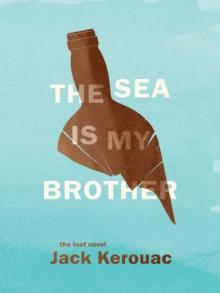 The Sea Is My Brother
The Sea Is My Brother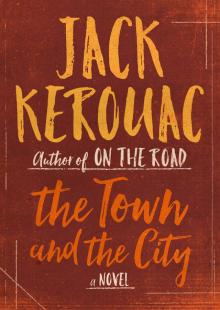 The Town and the City: A Novel
The Town and the City: A Novel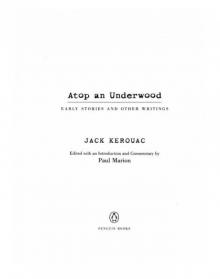 Atop an Underwood: Early Stories and Other Writings
Atop an Underwood: Early Stories and Other Writings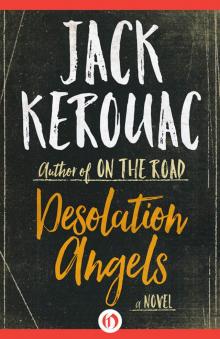 Desolation Angels: A Novel
Desolation Angels: A Novel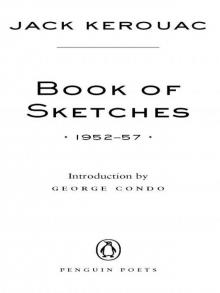 Book of Sketches
Book of Sketches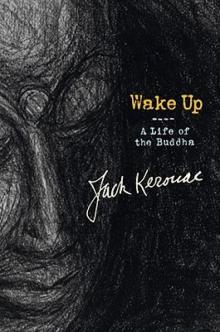 Wake Up: A Life of the Buddha
Wake Up: A Life of the Buddha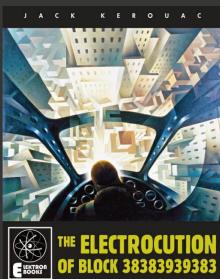 The Electrocution of Block 38383939383
The Electrocution of Block 38383939383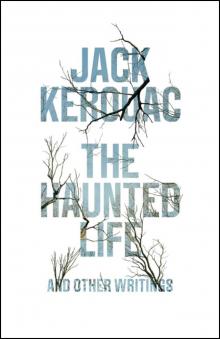 Haunted Life
Haunted Life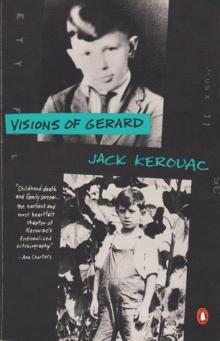 Visions of Gerard
Visions of Gerard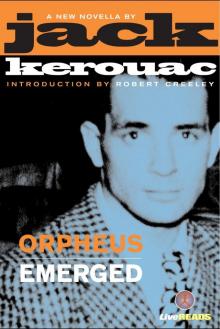 Orpheus Emerged
Orpheus Emerged Book of Blues
Book of Blues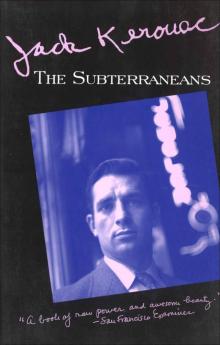 The Subterraneans
The Subterraneans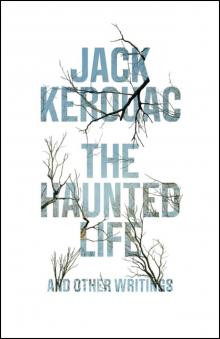 The Haunted Life
The Haunted Life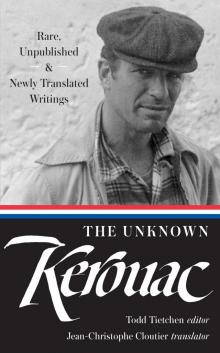 The Unknown Kerouac
The Unknown Kerouac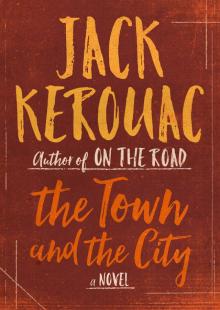 The Town and the City
The Town and the City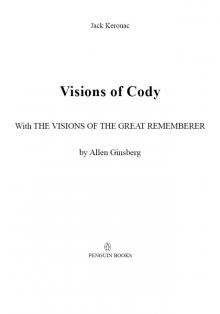 Visions of Cody
Visions of Cody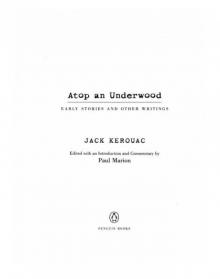 Atop an Underwood
Atop an Underwood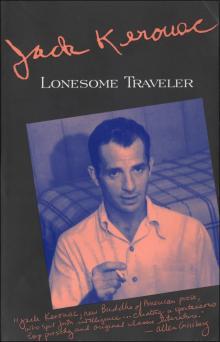 Lonesome Traveler
Lonesome Traveler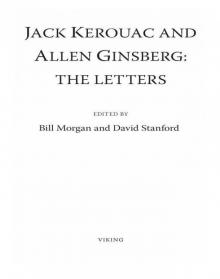 Jack Kerouac and Allen Ginsberg
Jack Kerouac and Allen Ginsberg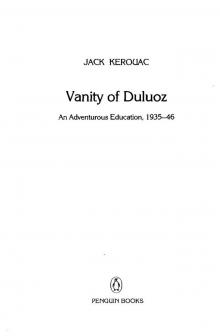 Vanity of Duluoz
Vanity of Duluoz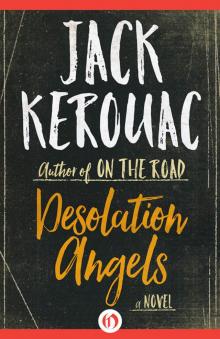 Desolation Angels
Desolation Angels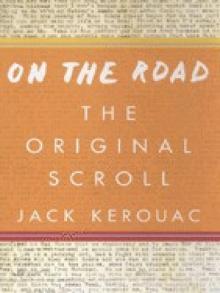 On the Road: The Original Scroll: (Penguin Classics Deluxe Edition)
On the Road: The Original Scroll: (Penguin Classics Deluxe Edition)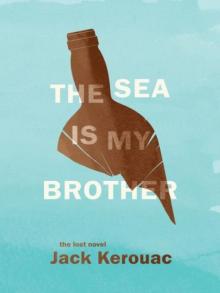 The Sea Is My Brother: The Lost Novel
The Sea Is My Brother: The Lost Novel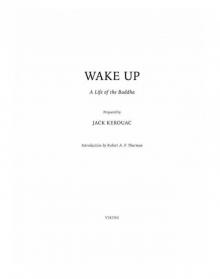 Wake Up
Wake Up The Poetry of Jack Kerouac
The Poetry of Jack Kerouac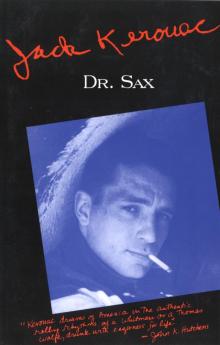 Doctor Sax
Doctor Sax